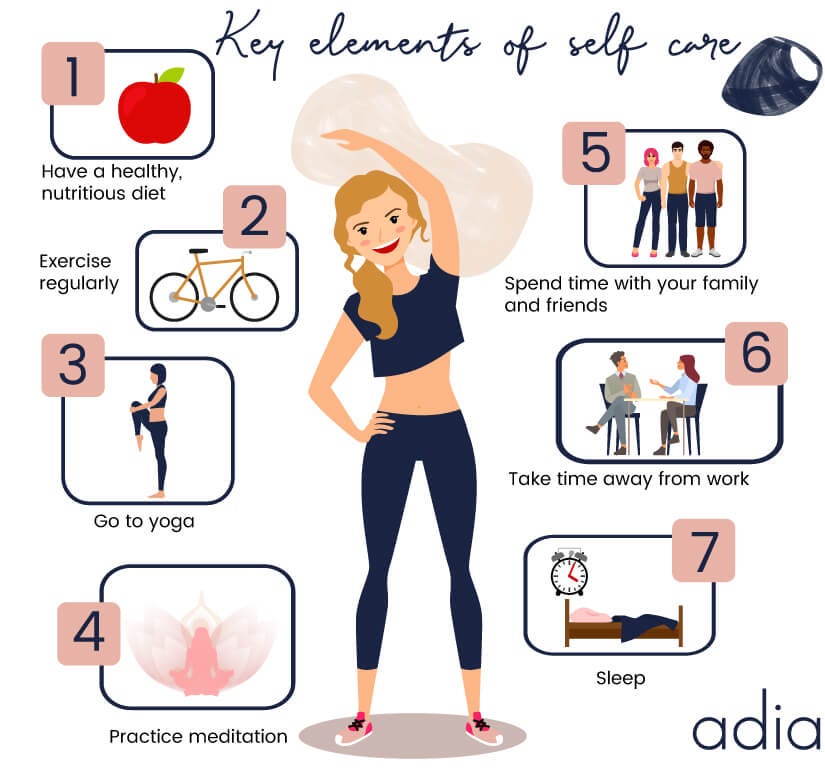The Mental Health Benefits of a Regular Self-Care Routine
Maintaining mental health is essential for overall well-being, and a regular self-care routine can play a significant role in achieving this. Self-care involves intentional activities and practices that promote physical, emotional, and mental health.
By incorporating self-care into your daily life, you can enhance your mental resilience, reduce stress, and improve your quality of life. 
This comprehensive guide explores the mental health benefits of a regular self-care routine, offering insights and practical tips for integrating self-care into your lifestyle.
Reducing Stress and Anxiety
- Mindfulness and Meditation
Mindfulness and meditation are powerful self-care practices that can significantly reduce stress and anxiety. By focusing on the present moment, mindfulness helps you detach from the worries of the past and future.
Meditation, on the other hand, involves deep breathing and mental relaxation techniques that calm the mind and body. Regular practice of these techniques can lead to reduced cortisol levels, the hormone associated with stress, and promote a sense of inner peace.
- Exercise and Physical Activity
Physical activity is a well-known stress reducer. Exercise releases endorphins, the body's natural mood elevators, which help to combat stress and anxiety. Whether it's a brisk walk, a yoga session, or a high-intensity workout, regular physical activity can improve your mental health.
Additionally, exercise provides a healthy distraction, allowing you to break the cycle of negative thoughts and worries.
- Healthy Eating
A balanced diet plays a crucial role in maintaining mental health. Nutrient-rich foods provide the energy and nutrients needed for optimal brain function. Omega-3 fatty acids, found in fish, nuts, and seeds, are particularly beneficial for reducing symptoms of depression and anxiety.
Incorporating a variety of fruits, vegetables, lean proteins, and whole grains into your diet can improve your mood and energy levels, contributing to better mental health.
Enhancing Emotional Well-being
- Journaling
Writing in a journal is a therapeutic activity that allows you to express and process your emotions. Journaling can help you gain clarity, understand your feelings, and reflect on your experiences.
By regularly documenting your thoughts and emotions, you can identify patterns and triggers, making it easier to manage your emotional well-being. This practice also serves as an outlet for releasing pent-up feelings and reducing emotional stress.
- Connecting with Loved Ones
Social connections are vital for emotional health. Spending time with friends and family provides support, comfort, and a sense of belonging. Engaging in meaningful conversations and sharing experiences can boost your mood and reduce feelings of loneliness and isolation.
Regular social interactions also reinforce positive behaviors and attitudes, contributing to overall emotional stability.
- Engaging in Hobbies and Interests
Pursuing hobbies and interests is an excellent way to nurture your emotional well-being. Engaging in activities you love brings joy, satisfaction, and a sense of accomplishment.
Whether it's painting, gardening, reading, or playing a musical instrument, hobbies provide an escape from daily stressors and offer a constructive way to spend your free time. These activities also encourage creativity and self-expression, further enhancing emotional health.
Improving Self-Esteem and Confidence
- Setting and Achieving Goals
Setting personal goals and working towards them is a powerful self-care practice that boosts self-esteem and confidence. Goals provide direction and purpose, giving you something to strive for.
Achieving these goals, whether big or small, fosters a sense of accomplishment and pride. This process helps build resilience and reinforces a positive self-image, essential components of mental health.
- Practicing Self-Compassion
 Self-compassion involves treating yourself with kindness and understanding, especially during difficult times. It means recognizing that everyone makes mistakes and that failure is a part of life.
Self-compassion involves treating yourself with kindness and understanding, especially during difficult times. It means recognizing that everyone makes mistakes and that failure is a part of life.
By practicing self-compassion, you can reduce self-criticism and negative self-talk, which are detrimental to self-esteem. Instead, focus on your strengths and achievements, and be gentle with yourself when things don't go as planned.
- Maintaining a Positive Body Image
A regular self-care routine that includes physical activities, healthy eating, and personal grooming can improve your body image. Feeling good about your physical appearance can enhance your self-esteem and overall confidence.
It's important to embrace a positive and realistic view of your body, appreciating it for what it can do rather than solely focusing on appearance. This shift in perspective promotes a healthier relationship with yourself and your body.
Building Resilience and Coping Skills
- Developing Healthy Coping Mechanisms
Self-care practices help you develop healthy coping mechanisms for dealing with life's challenges. Techniques such as deep breathing, progressive muscle relaxation, and guided imagery can be effective in managing stress and anxiety.
By incorporating these practices into your routine, you build a toolkit of strategies to draw upon during difficult times, enhancing your resilience and ability to cope.
- Establishing Boundaries
Setting healthy boundaries is a crucial aspect of self-care. Boundaries protect your mental and emotional well-being by ensuring that your needs are met and that you are not overwhelmed by external demands. This involves saying no to activities or commitments that drain your energy and prioritizing those that bring you joy and fulfillment.
Establishing boundaries allows you to maintain a balance between personal and professional life, reducing stress and preventing burnout.
- Seeking Professional Support
Sometimes, self-care involves seeking professional help. Therapy and counseling provide a safe space to explore your thoughts and feelings with a trained professional. Therapists can offer valuable insights, coping strategies, and support for managing mental health issues. Regular sessions with a mental health professional can complement your self-care routine, providing additional resources and guidance for maintaining mental well-being.
Conclusion
A regular self-care routine is essential for maintaining and enhancing mental health. By incorporating practices such as mindfulness, exercise, healthy eating, journaling, social connections, and professional support, you can reduce stress, improve emotional well-being, boost self-esteem, and build resilience.
These benefits contribute to a balanced, fulfilling life where mental health is prioritized and nurtured. Embrace self-care as a fundamental part of your daily routine, and experience the transformative impact it can have on your mental health.
16 Simple Ways to Relieve Stress and Anxiety
How to manage and reduce stress




































